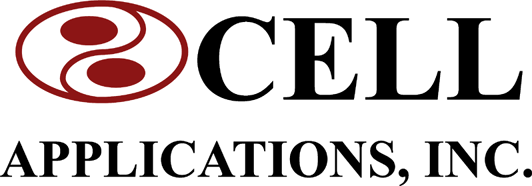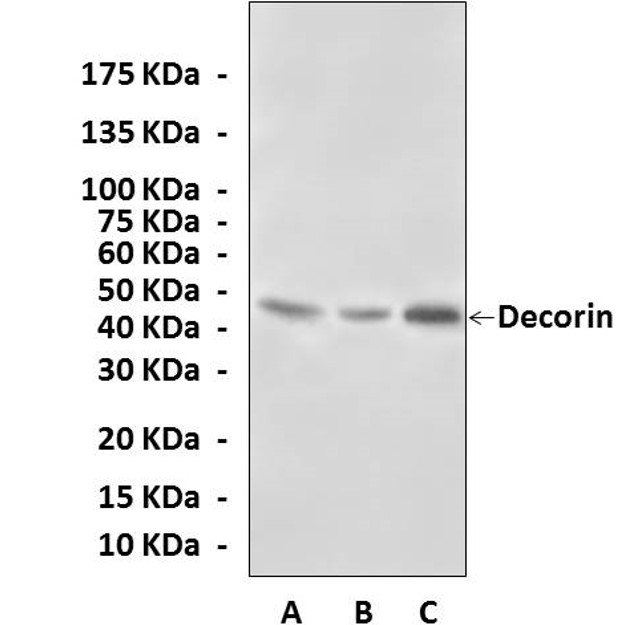Product Sheet CA1314
Description
BACKGROUND
Decorin, a member of the small leucine-rich proteoglycan (SLRPs) gene family that harbors one chondroitin/dermatan sulfate side chain at its N terminus, was originally named because of its ability to “decorate” collagen fibrils, thereby regulating fibrillogenesis, a key mechanism of matrix assembly and homeostasis. It was soon discovered that Decorin is not only a matrix component, but also a signaling molecule that can affect the behavior of cells during development and disease progression. Indeed, Decorin is involved in a multitude of biological processes including modulation of various growth factors and receptors, renal diseases, angiogenesis, wound healing, myocardial infarction, lung and tendon mechanics, infectious diseases, bone and tooth development, connective tissue development and bone marrow stromal cell biology.1 It was demonstrated that Decorin regulates the TGF-beta signaling pathway and also inhibits the growth of a variety of tumor cells by down-regulating the EGF receptor (EGFR) and other members of the ErbB family of receptor tyrosine kinase (RTK) as well as IGF-I receptors. It was also shown that that Decorin interacts with Met, the receptor for hepatocyte growth factor (HGF), which promotes proliferation and invasion when constitutively activated in cancer cells. Although binding to Decorin briefly activated Met, this only led to the receptor's rapid down-regulation via two different pathways: by intracellular degradation and by cleavage of its extracellular domain.2 Furthermore, It was demonstrated that Decorin blocks several biological activities mediated by the Met signaling axis, including cell scatter, evasion and migration. These effects were mediated by a profound downregulation of noncanonical beta-catenin levels. In addition, Myc, a downstream target of beta-catenin, was markedly downregulated by Decorin. These effects occur at both transcriptional and posttranslational levels via a noncanonical Wnt pathway, and cause inhibition of motility and migration, and ultimately lead to tumor growth suppression, both in vitro and in vivo.3 In addition, Decorin suppresses tumor cell–mediated angiogenesis by inhibiting the endogenous production of vascular endothelial cell growth factor similar to neutralizing antibodies directed toward EGFR. Genetic deficiency of Decorin causes intestinal tumor formation through disruption of intestinal cell maturation, whereas mice with a double deficiency of Decorin and p53 succumb prematurely to aggressive lymphomas. Thus, it is clear that lack of Decorin is permissive for in vivo tumorigenesis. Thus, Decorin could become a new therapeutic modality against various forms of tumors which often have increased levels of multiple growth factor receptors. However, Decorin has been implicated as a protective factor in atherosclerotic vascular disease. Moreover, it was shown that the expression of Decorin is increased during the development of diabetic kidney disease and Decorin is a natural protective factor against diabetic nephropathy.4
References:
1. Iozzo, R.V. & Murdoch, A. D. FASEB J. 10:598-614, 1996
2. Goldoni, S. et al: J. Cell Biol. 185:743-54, 2009
3. Buraschi, S. et al: J. Biol. Chem. 2010
4. Merline, R. et al: J. Physiol. Pharmacol. 60 (Suppl 4):5-13, 2009
Details
| Cat.No.: | CA1314 |
| Antigen: | Short peptide from human Decorin sequence. |
| Isotype: | Affinity-Purified Rabbit Polyclonal IgG |
Species & predicted species cross- reactivity ( ): | Human, Mouse, Rat |
Applications & Suggested starting dilutions:* | WB 1:1000 IP n/d IHC (Paraffin) n/d ICC n/d FACS n/d |
Predicted Molecular Weight of protein: | 45 kDa |
| Specificity/Sensitivity: | Detects endogenous levels of Decorin proteins without cross-reactivity with other related proteins. |
| Storage: | Store at -20°C for at least one year. Store at 4°C for frequent use. Avoid repeated freeze-thaw cycles. |
*Optimal working dilutions must be determined by end user.
Products
| Product | Size | CAT.# | Price | Quantity |
|---|---|---|---|---|
| Rabbit Decorin Antibody: Rabbit Decorin Antibody | Size: 100 ul | CAT.#: CA1314 | Price: $375.00 |

